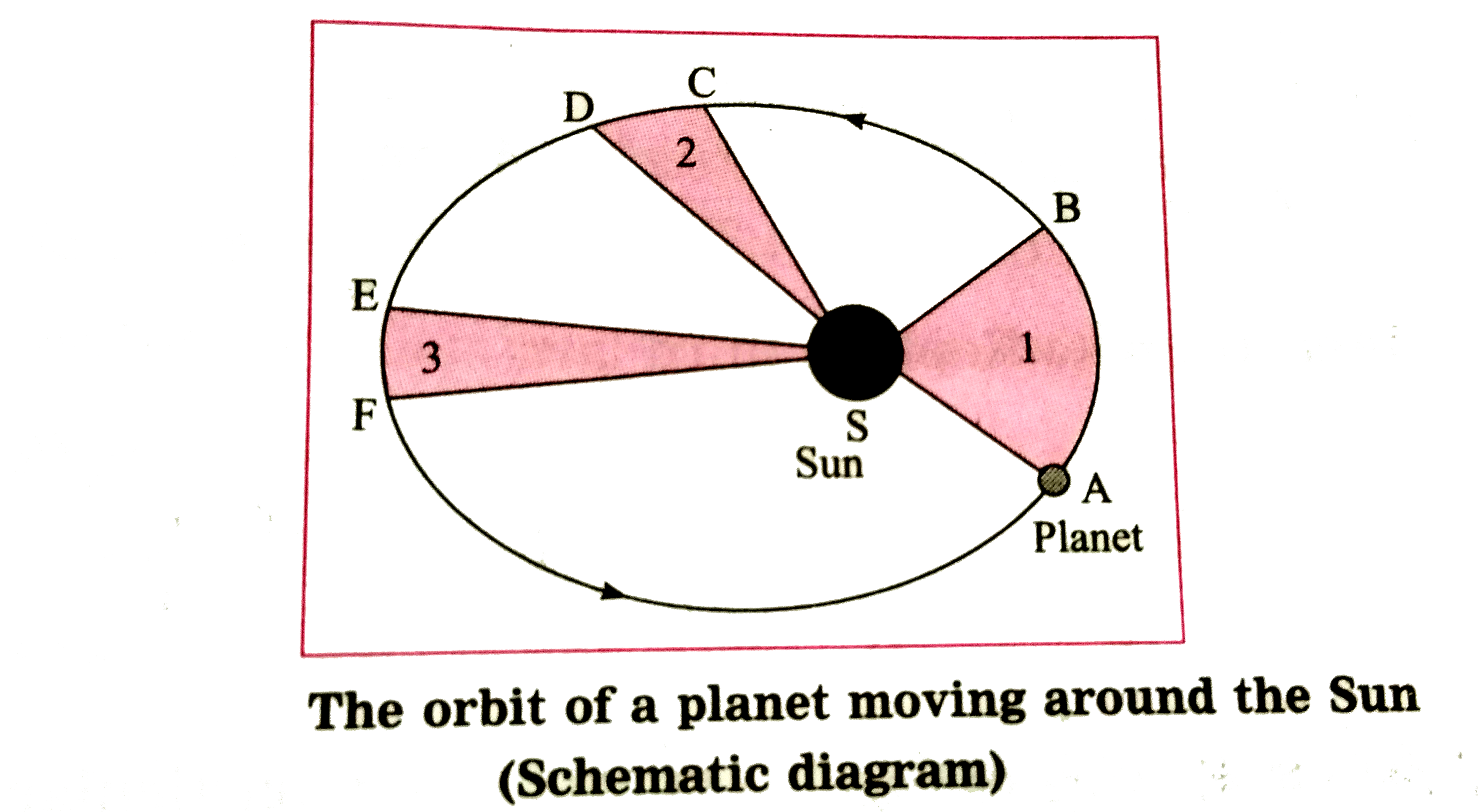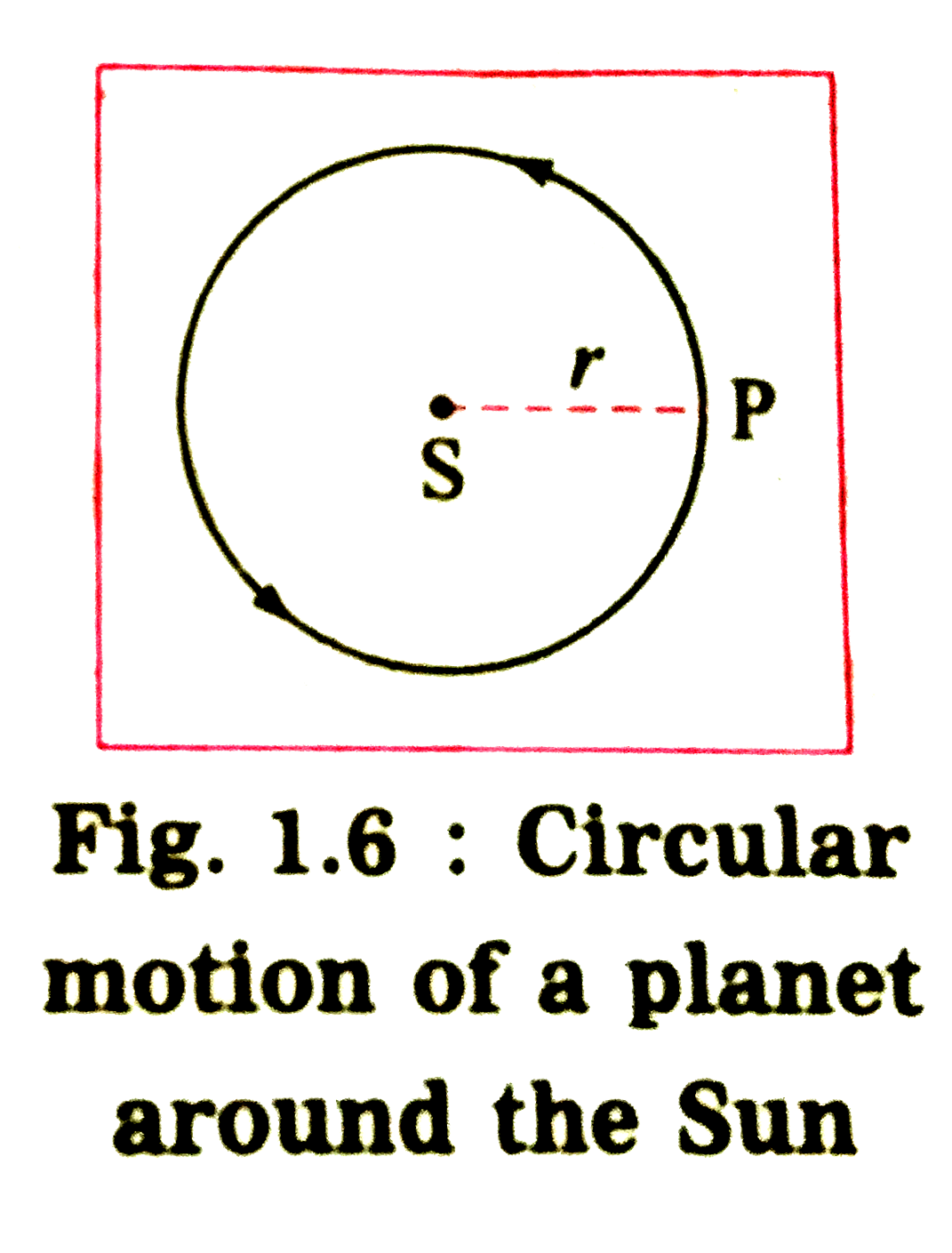Write the three laws given by Kepler. How did they help Newton to arrive at the inverse square law of gravity?
Video Solution
Text Solution
Kepler's first law :
The orbit of a planet is an ellipse with the Sun at one of the foci.

Figure 1.5 shows the elliptical orbit of a planet revolving around the Sun (S).
Kepler's second law :
The line joining the planet and the Sun sweeps equal areas in equal intervals of time.
A→B,C→DandE→F are the displacements of the planet in equal intrvals of time.
The straight lines AS, CS and ES sweep equal areas in equal areas in equal intervals of time.
Area ASB = area CDS = area ESF.
Kepler's third law :
The square of hte period of revolution of a planet around the Sun is directly proportional to the cube of the mean distance of the planet from the Sun.
Thun, if r is the average distance of the planet from the Sun and T is its period of revoltuion, then,
T2∝r3, i.e., T2r3=constant = K
For simplicity we shell assume the orbit to be a circle. In Fig. 1.6, S denotes the position to the Sun, P denotes the position the position of a planet at a given instant and r denotes the radius of the orbit (≡ the distance of the planet from the Sun). Here the speed of the planet is uniform. It is

v=circumference of the circleperiod of revoltuion of the planet
=2πrT.
If m is the mass of the planet, the centripetal force exerted on the planet by the Sun (≡ gravitational force), F=mv2r
∴F=m(2πr/T)2r=4π2mr3T2r=4π2mrT2
According to Kepler's third law,
T2=Kr3
∴F=4π2mrKr3=4π2mK(1r2)
Thus, F∝1r2 as 4π2mK is constant in a particular case.
|
Topper's Solved these Questions
- GRAVITATION BOOK - NAVNEET PUBLICATION - MAHARASHTRA BOARDCHAPTER - GRAVITATION EXERCISE - Give scientific reasons :
3 Videos
- GRAVITATION BOOK - NAVNEET PUBLICATION - MAHARASHTRA BOARDCHAPTER - GRAVITATION EXERCISE - Distinguish between :
2 Videos
- GRAVITATION BOOK - NAVNEET PUBLICATION - MAHARASHTRA BOARDCHAPTER - GRAVITATION EXERCISE - QUESTIONS & ANSWERS
45 Videos
- GIVE SCIENTIFIC REASONS BOOK - NAVNEET PUBLICATION - MAHARASHTRA BOARDCHAPTER - GIVE SCIENTIFIC REASONS EXERCISE - CHAPTER 10 : DISASTER MANAGEMENT
2 Videos
- HEATBOOK - NAVNEET PUBLICATION - MAHARASHTRA BOARDCHAPTER - HEATEXERCISE - NUMERICAL PROBLEMS FOR PRACTICE
12 Videos
Similar Questions
Knowledge Check
Forces which obey inverse square law are
AGravitational forcesBElectromagnetic forcesCNuclear forcesDBoth (1) & (2)Which of the following is not the inverse square law force?
AElectric forceBGravitational forceCNuclear forceDMagnetic force between two poles
Do electromagnetic forces obey inverse square law?
View SolutionName the forces which obey inverse square law.
View SolutionWhich of the kepler's laws of planetary motion led Newton to establish the inverse-sguare rule for gravitational force between two bodies
View SolutionDo cohesive and adhesive forces obey inverse square law?
View SolutionNewtons law of gravity and force
View SolutionWhich of kepler's laws led N ewt on to inverse square rule for gravitational force ?
View Solution
